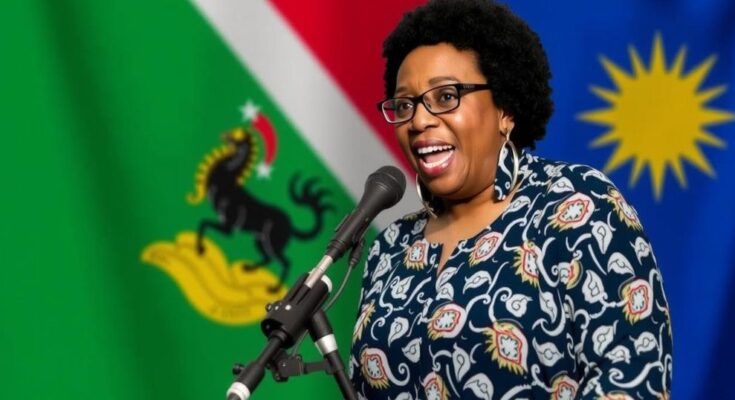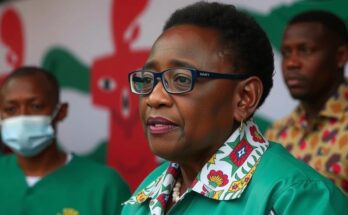Namibia is set to vote in a presidential election that could produce its first female leader, Netumbo Nandi-Ndaitwah. As the ruling SWAPO party’s candidate, she aims to address high unemployment, particularly among youth, with ambitious job creation goals. Nandi-Ndaitwah’s campaign unfolds against a backdrop of declining party support, reflecting regional electoral trends and pressing economic issues.
Namibia is poised for a significant electoral event as it votes for its next president, presenting a historical opportunity for the country to elect its first female leader. Netumbo Nandi-Ndaitwah, a prominent figure in the independence movement of the 1970s and currently the vice president, is the candidate for the ruling SWAPO party. Having gained momentum from early voting results, she stands as a strong contender despite her party facing mounting public dissatisfaction due to persistent unemployment and economic struggles, particularly impacting the youth.
The SWAPO party has held power since Namibia’s independence from South African rule in 1990, yet recent challenges in the region highlight a shift in voter sentiment. There have been significant electoral upsets in neighboring nations, mirroring the frustration reflected in Namibia, where the unemployment rate currently affects 20% of the youth population. Nandi-Ndaitwah’s campaign includes ambitious plans to allocate approximately 85 billion Namibian dollars, aiming to create over 500,000 jobs. Critics, however, describe these goals as overly optimistic.
Amidst this backdrop, approximately 1.4 million Namibians are registered to determine both the presidency and the composition of Parliament. Notably, Nandi-Ndaitwah’s candidacy marks a rare chance for a female leadership role in a region where such representation is scarce. Furthermore, the election context is made more complex by the recent death of President Hage Geingob, leading to the interim leadership of Nangolo Mbumba. As voting unfolds, issues including reproductive rights, equal pay, and healthcare are expected to resonate strongly with the electorate.
The impending presidential election in Namibia represents a pivotal moment in the nation’s political landscape, with the possibility of electing the first female leader. Netumbo Nandi-Ndaitwah’s candidacy as the SWAPO party candidate brings to light the long-standing inequity in gender representation in African leadership. Additionally, the broader context is underscored by a growing public discontent with SWAPO’s governance amidst economic challenges, paralleling recent electoral changes in neighboring countries. This election could signal a significant shift in political dynamics and voter aspirations in Namibia.
In summary, Namibia’s upcoming presidential election poses both a historical opportunity for female leadership and a critical moment for the ruling SWAPO party, facing growing voter discontent amid economic challenges. Nandi-Ndaitwah’s candidacy is emblematic of both potential progress and the mounting pressure for socio-economic reforms. As nearly half the population prepares to vote, the directions taken by young voters, alongside issues particularly affecting women, will undoubtedly shape the outcome and future political landscape of Namibia.
Original Source: abcnews.go.com




